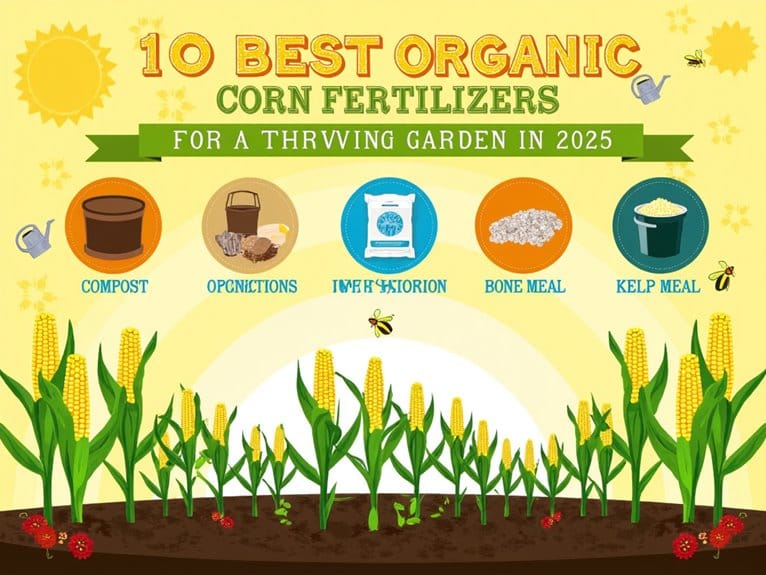Organic Fertilizer Options: Natural Plant Nutrition Sources for Chemical-Free Gardening
You can use compost, manure, or bone meal as natural organic fertilizers that build long-term soil health without synthetic chemicals. Compost improves texture and water retention while releasing nutrients slowly, making it ideal for containers or gardens needing improvement. Manure provides nitrogen, phosphorus, and potassium essential for plant growth, while wood ash adds potassium and adjusts pH levels. These options not only nourish plants but also support microbial life in the soil, creating a sustainable foundation for your garden’s success. As you explore these natural sources, you’ll discover how to balance them for the best results.
Notable Insights
- Compost improves soil texture, water retention, and nutrient availability for chemical-free gardening.
- Animal manure provides essential nutrients like nitrogen, phosphorus, and potassium for plant growth.
- Wood ash adjusts pH and supplies potassium, acting as a natural fertilizer supplement.
- Comfrey leaves create nutrient-rich teas for plants without synthetic chemicals.
- Seaweed offers trace elements as a fermented liquid feed for organic gardening needs.
Plant-Based Organic Fertilizers: Compost and Natural Amendments
As you explore organic gardening solutions, compost stands out as a versatile, plant-powered way to enrich your soil.
Compost benefits plants by improving texture, water retention, and nutrient availability while supporting beneficial microbes. As an organic amendment, it releases nutrients slowly, avoiding burn risks and feeding the soil long-term. The slow nutrient release aligns with plant growth cycles Pair compost with green manures or wood ash for added nitrogen or potassium. These natural amendments also boost organic matter, enhancing aeration and drainage for stronger root systems.
Whether you’re starting a garden or improving existing beds, plant-based fertilizers create resilient, chemical-free soil that thrives with minimal input. Modern dual-chamber tumblers allow continuous composting by keeping one chamber decomposing while fresh materials are added to the other.
Let the decomposition process work its magic-your plants will thank you with bountiful harvests and healthier landscapes.
Animal-Derived Fertilizers: Manure and Bone Meal Essentials
While proper soil care sets the stage, animal-derived fertilizers offer a powerful way to boost plant health naturally.
Manure benefits your garden with nitrogen, phosphorus, and potassium-perfect for lush growth and strong roots. Bone meal adds extra phosphorus, essential for bulbs and root crops to thrive. Both enrich the soil with organic matter, supporting microbes that keep nutrients cycling.
Manure provides nitrogen, phosphorus, potassium for robust growth; bone meal boosts phosphorus, perfect for bulbs and root vegetables.
- Composted manure prevents burns and pathogens while feeding the soil steadily.
- Bone meal releases phosphorus slowly, matching plant needs without excess runoff.
- Animal-based fertilizers improve structure and water retention naturally.
- They support biodiversity, creating a resilient ecosystem for your garden.
These organic options are safer for edible plants, ensuring clean harvests while maintaining sustainable growing practices.
soil microbial activity is enhanced by the organic compounds in animal-derived fertilizers.
The Science of Slow Nutrient Release in Organic Soil
Slow nutrient release in organic soil happens as microbes break down complex compounds over time, feeding plants gradually without overwhelming them. This process relies on careful design-like coated granules or natural polymers-that controls how quickly nutrients escape into the soil. The controlled release is facilitated by semi-permeable polymers that act as barriers, allowing nutrients to diffuse at a rate determined by environmental conditions. This slow-release technology ensures continuous plant nutrition for 2-6 months while minimizing the risk of nutrient leaching and reducing the need for frequent reapplication.
Nutrient Breakdown Process
Even though the process might feel a bit patient-oriented, the nutrient breakdown in organic soil is anything but slow-it’s a dynamic dance between microbes and matter. Microbial decomposition transforms complex organic compounds into simple nutrients through nutrient mineralization, releasing them gradually as plants need them most.
- Organic matter acts like a nutrient time capsule, slowly giving up its store as microbes feast and decay.
- Warm, moist soils speed up this cycle while dry or frozen ground halts it completely.
- Composted manure starts closer to ready-to-use nutrients than raw materials did.
- Plants benefit from this steady supply rather than the shock of chemical fertilizers.
This natural rhythm builds soil health over time, making every gardening effort count more deeply than a quick fix.
Microbial Interaction Dynamics
Whereas nutrients in organic soil reveal themselves gradually rather than all at once, this steady supply comes from microbes breaking down complex compounds into forms plants can use. Microbial community dynamics drive these slow nutrient release processes through intricate soil nutrient interactions.
| Environmental Factor | Microbial Impact | Nutrient Connection |
|---|---|---|
| Soil pH | Shapes microbial composition | Influences phosphorus availability |
| Moisture levels | Regulates metabolic activity | Affects organic matter decomposition |
| Temperature | Modifies population growth | Warmer soils boost microbial biomass |
| Organic Matter | Provides carbon sources | Microbes utilize plant residues for energy |
| Plant Diversity | Encourages rhizosphere variation | Different roots support varied communities |
These interactions create a self-sustaining system where microbes not only release nutrients but also stabilize them through complex biochemical pathways. Understanding these dynamics helps gardeners harness nature’s own timing mechanism for nourishing plants.
Comparing Organic Vs Synthetic Fertilizer Efficiency
Have you ever wondered how your fertilizer choices shape not just your garden but the soil beneath it? Organic fertilizers release nutrients slowly as they decompose, building steady availability over time.
Synthetic options deliver immediate nutrient uptake for quick fixes. Comparative efficiency depends on your goals-organic supports long-term health while synthetic offers rapid results.
Synthetic fertilizers act quickly, while organic build health slowly-choose based on your garden’s needs and vision.
- Organic nutrients depend on microbial activity, making timing essential
- Synthetic consistency aids precise application
- Soil structure improves with organic matter buildup
- Microbial balance thrives from natural inputs
Nutrient availability varies dramatically between methods, affecting plant responses and environmental impact.
Choose wisely to nourish both your plants and planet.
Sustainable Practices With Local Organic Material Sources

Let’s stretch our thinking beyond the compost bin-what about your driveway, garage, or even backyard? Local sourcing reveals hidden gardens in our own spaces. A rain barrel collects water for plants, while fallen leaves become mulch. Food scraps join a community composting effort, turning waste into wealth.
| Material Source | Nutrient Benefit | Practical Use |
|---|---|---|
| Horse manure | High nitrogen | Direct soil amendment |
| Wood ash | Potassium & pH adjustment | Acidic soil correction |
| Comfrey leaves | Macro/micro nutrients | Tea for plants |
| Seaweed | Trace elements | Fermented liquid feed |
Avoiding Common Organic Fertilizer Application Mistakes
While organic fertilizers offer numerous benefits, their effectiveness depends on how they’re applied, as improper use can waste nutrients and harm plants instead of helping them thrive.
Avoid overapplication by testing soil first-you don’t want to burn roots or create nutrient imbalances. Time your fertilizer applications carefully; nitrogen in winter can leach away, while cold soil slows uptake.
Use slow-release options for steady feeding rather than heavy doses. And match the fertilizer type to what your plants need-leafy greens require more nitrogen than flowering bushes.
- Test soil before applying to avoid over-fertilizing
- Apply nutrients when plants actively grow, not when they’re dormant
- Choose formulations that align with specific growth stages
- Balance organic and inorganic supplements for complete nutrition
Frequently Asked Questions
What Certifications Verify Organic Fertilizer Quality?
Certifications like USDA Organic and OMRI lists verify quality.
The USDA certification standards require 3 years without prohibited substances and annual inspections to ascertain no synthetic chemicals.
Look for the organic labeling seal when buying fertilizers – it means they’re made with natural sources like compost and manure, following strict NOP guidelines.
These certifications guarantee you’re getting real organic nutrition for your garden.
How Do Ph Levels Affect Organic Fertilizer Performance?
You might be wondering how pH balance affects organic fertilizer performance. When soil pH is too low or high, it limits nutrient availability essential for plant growth.
At ideal levels (6.0-7.0), nutrients like nitrogen and phosphorus become most accessible. However, imbalanced pH can hinder microbial activity that breaks down organic matter, slowing nutrient release.
Testing your soil and adjusting pH with amendments guarantees fertilizers work efficiently, supporting healthy chemical-free gardening.
Are Organic Fertilizers Safe for Edible Plant Gardens?
Yes, when used properly. They offer natural nutrition without harsh chemicals, supporting healthy growth and gardening safety.
Choose well-composted materials like aged manure or plant-based compost to minimize pathogen risks.
Proper application techniques guarantee your vegetables, herbs, and fruits receive all the nutrients they need without contaminating your harvest.
Always follow safe practices like testing soil before fertilizing and avoiding direct contact between raw organic matter and edible crops near harvest time.
With care, organic gardening delivers bountiful, chemical-free produce right from your garden plot.
Can Organic Fertilizers Prevent Soil Compaction Naturally?
Yes, organic fertilizers can prevent soil compaction naturally.
By improving soil structure, they create air spaces that let roots breathe and grow stronger. Natural amendments like compost or manure feed microbes that break down compacted layers over time.
Adding organic matter loosens the soil, making it easier for plant roots to push through.
It also boosts nutrient levels, which support healthier plants that physically break up hardpan naturally.
Regular applications of these fertilizers keep your garden’s soil loose and ready for new growth - no tilling needed!
Do Organic Options Work Equally Well in Hydroponic Systems?
Organic hydroponics can be effective, but nutrient availability differs from traditional soil-based methods.
Substrate systems like Deep Bed show better growth with organic fertilizers due to improved mineral uptake and root development.
However, direct water delivery faces challenges with unrefined organic minerals that don’t dissolve easily.
While promising, optimizing nutrient efficiency and standardizing organic hydroponic blends remain essential for success.
On a final note
As you explore organic fertilizers, remember these natural options nourish your garden without chemical additives. Proper application guarantees plants receive a steady supply of nutrients rather than sudden spikes. By sourcing compost or aged manure from local farms, you support sustainable practices that benefit both your plot and the planet. Don’t be discouraged if results take a season-organic gardening rewards patience with healthier soil and more resilient plants over time.






